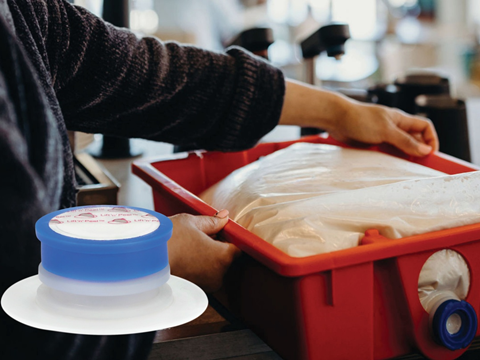
In response to growing demands for closed dairy dispensing systems in the foodservice industry, Liquibox, now part of SEE (formerly Sealed Air), has introduced the Liquibox Universal Self-Sealing Cap.
Used in closed milk bag-in-box and bag-in-tray systems, the cap reportedly reduces food waste, provides enhanced hygiene, extended freshness, and streamlines cost efficiency compared to pour-out packaging solutions such as bottles and cartons.
The cap is a hygienic self-closing fitment for 2- to 20-litre professional dairy dispensing systems. Aimed at the evolving needs of restaurants, convenience stores, petrol stations and catering institutions, it is designed for applications such as milk dispensers and frothers for bean-to-cup coffee machines, smoothie and frappe dispensers, and soft-serve ice cream dispensers.
Apparently, the Universal Cap has complete compatibility with all dairy, coffee machine, and frappe/smoothie dispenser connectors, re-sealability ensuring product integrity, and plug-and-play functionality for changeovers. SEE says that, as the ‘only PP and silicone-free alternative in the market’, there is no need to separate the cap’s components prior to recycling. The dispensing fitment is suitable for fresh, ESL, hot fill, and aseptic processes, and integrates with existing bag-in-box equipment.
SEE states that, by adopting the Liquibox Universal Self-Sealing Cap closed-loop system, businesses can cut food and packaging waste while reducing CO2 emissions. With portion control, it minimizes overpouring and residual waste compared to traditional bottles and cartons.
It claims that, according to the COMPASS EcoImpact LCA, switching to an aseptic 8L bag-in-box system from a 1L UHT carton or PET bottle for milk can cut CO2 emissions by approximately 70% due to improved product-to-package efficiency.
It is also designed for recycling in existing PE streams, as certified by Cyclos certificate no. 2499-2024- 004113. The degree of recyclability of the final package depends on the specific product configuration or components intended for recycling and the scope and availability of appropriate local recycling facilities.
At the start of this year, SEE announced it would be implementing new digital die-cutting capabilities for its Sealed Air brand - Korrvu retention and suspension packaging - aiming to decrease production lead times and free up storage space at customer facilities. Korrvu packaging surrounds products with a low-slip film to protect them from shock and vibration and is apparently kerbside recyclable with the plastic film attached.
More recently, Eastman and SEE launched a lightweight, certified compostable tray, designed to replace traditional polystyrene foam alternatives in protein packaging applications. Made using Eastman’s Aventa Renew material, the new tray is made from wood pulp and acetyl from a portfolio of recycled material. It is apparently certified as home compostable by TÜV Austria, and as industrially compostable by the Biodegradable Products Institute (BPI).
If you liked this story, you might also enjoy:
How are the top brands progressing on packaging sustainability?
The ultimate guide to global plastic sustainability regulation


















No comments yet